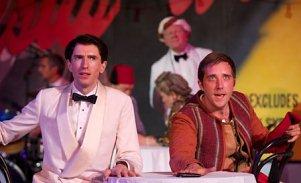The Comedy Of Errors Review Open Air Theatre 2010
Even theatregoers in Shakespeare's day must have had to suspend a significant amount of disbelief in order to watch 'The Comedy of Errors' without queuing up to get their money back. The reason is that the play has a totally ludicrous plot, even if it does contain some of Shakespeare's favourite themes: twins, mistaken identify, shipwrecks, to name a few. However, the story provides both actors and directors with the justification - if any were really needed - to let their artistic imaginations run amok. And the results can sometimes rival the oddity of the play.
'The Comedy of Errors' holds two records among the cannon of Shakespearian plays. First, it's the shortest play (less than half the size of 'Hamlet', the longest play) and it's also Shakespeare's earliest comedy, first performed in 1594.
Shakespeare fathered twins - Judith and Hamnet - so it's not surprising that twins figure in a number of his plays. But in 'The Comedy of Errors' he took the idea to extreme and used two sets of twins - all male, and all born at more or less the same time. The twins are divided into master-servant relationships. So, one brother from one set of twins is the master and his servant is a brother from the other set of twins. Confused? Well, to make matters worse, the twins have the same names. So we have two Dromios and two Antipholuses. Both pairings have fetched up in Ephesus having been separated from each other and their parents in a shipwreck years before. By coincidence, their father also finds himself in Ephesus and their long-lost Mum turns up at the end of the piece. If it all sounds as improbable as a TV soap, you've probably got the picture.
Philip Franks' production is inventive and creative even if it stretches the limits of imagination somewhat - there's a role for a gorilla, for example. Though it verges on the bizarre at times, especially in the latter stages, dance, music and singing make it more of a musical than a play. That doesn't seem at odds with the basic farcical plot and it ramps up the entertainment value considerably. Confusion bordering on chaos is obviously the order of the day, but it's all well-controlled. Franks has concocted a setting which embraces Morocco in the 1930s/ early 1940s with significant echoes of the film Casablanca - the Antipholuses even wear white dinner jackets like Humphrey Bogart.
Gideon Davey's set is striking largely because it's, er, large. A huge billboard dominates the proceedings with an elevated walkway in front of it which provides access to concealed doors and windows. The billboard sports the words "Ephesus welcomes you" with the small print adding "Excludes all those from Syracuse". The main acting area is actually huge and doubles as market place, beach and restaurant. Angled and with exaggerated perspective, this impressive and innovative set gives the play a dream-like, or even nightmarish quality. Very apt.
So what of the two sets of twins? Well, director Philip Franks doesn't seem to have tried very hard to make them identical - in fact I think he may well have decided to do the opposite. Though it's true that the twins resemble their brothers, they also have their own, individual personalities which is probably what Shakespeare found fascinating about twins anyway. Joseph Kloska is Dromio of Syracuse and Josh Cohen is Dromio of Ephesus. Both are down-to-earth, reasonable fellows who find their masters have suddenly become unpredictable and the rest of society has followed suit, causing them much grief. Individuality is also a feature of the two Antipholuses - Daniel Weyman (Syracuse) and Daniel Llewelyn-Williams (Ephesus). The latter is the suave, knowing man-about-town, whereas Weyman seems less experienced socially, a kind of Bertie Wooster character if you like, who nonetheless rises to the occasion when his twin's wife mistakes him for his brother.
Veronica Roberts provides a formidable Abbess, Faye Winter is a humorous French maid, and Anna-Jane Casey not only provides stylish glamour but also excellent vocals as the Courtesan. The small band is in fine form, nimbly covering the scene transitions and accompanying the amusing dances.
'The Comedy of Errors' is a play to have fun with and Philip Franks and his team have done just that. He's mixed style with humour, introduced some excellent music and dance, and overall keeps us amused and engaged in spite of, or even because of the ludicrous plot. As long as you don't take it too seriously or literally, it's a well executed, enjoyable and distracting summery romp.
(Peter Brown)
"The more I see this play, the more it strikes me as one the finest farces in the English language. In fact, it plays so well, there is little need to gussy up the action with musical titbits as Philip Franks's otherwise delightful production does."
Michael Billington for The Guardian
"Everything about Philip Franks's new production of Shakespeare's early farcical comedy is clearly designed to entertain and delight. But my initial grin of pleasure slowly turned into a grimace as his somewhat laborious staging progressed, and there were too many moments when I found myself merely bored."
Charles Spencer for The Daily Telegraph
"It's a carefully wrought and well-controlled production, dancing just this side of delirium, but just the job if the weather stays fine."
Michael Coveney for The Independent
"This is an uplifting, watchable, strongly musical Comedy Of Errors and among the laughter it even wrings a few sobs out of the audience at its climax."
Quentin Letts for The Daily Mail
"Entertaining, big on charm - but that doesn't quite lift off into the looked-for delirium. It's a pleasant evening, but not a vintage one."
Sarah Hemming for The Financial Times
External links to full reviews from popular press
Telegraph - Telegraph - Financial Times - The Independent
Originally published on
